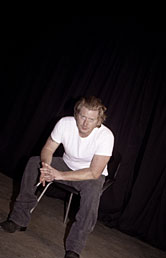Killer’s Head
A Monologue by Sam Shepard
 Killer’s Head is a one act play written by Sam Shepard in 1975. For those unfamiliar with this work, the play deals with adult subject matter, as the sole character, Mazon, presents a monologue while strapped to an electric chair.
Killer’s Head is a one act play written by Sam Shepard in 1975. For those unfamiliar with this work, the play deals with adult subject matter, as the sole character, Mazon, presents a monologue while strapped to an electric chair.
Excerpts from “Killer’s Head: A monologue by Sam Shepard”
“…Jet Deck on the top side. Lady Bug Moon on the bottom. Bright red sorrel horse…”
“…Jesus! You should see that stud, boy! Does the quarter mile in twenty-one seconds dead. Like to rip the silks right off that jockey. Said they never seen an Appaloosa like him…”
Co-Produced and Co-directed by Alice Ferrulo, Image-Maker of Black Horse Theatre, and Zach Thompson; Featuring Zach Thompson as Mazon
“Black Horse Theatre: Dark… at its brightest” is committed to addressing the human state of being. It does so with great intensity and passion. Always intimate and vulnerable, the work is set forth in hopes of rattling the mind and spirit. To achieve its mission, Black Horse Theatre uniquely draws upon components of dance, theatre, and film to design signature images that are urgent and impactful.
Cast and Crew
- Alice Ferrulo
- Zach Thompson
- “Mic” Knight
- Peter Melaragno
- Michael Conway
- Ryan J. McPherren
- Derrick A. Johnson
- Beau Smith
About the Playwright, Sam Shepard:
Playwright and actor, a major force in contemporary American theatre since his earliest work. Shepard's plays are not easy to categorize, but in general they blend images of the Old West, fascination with pop culture - rock and roll, drugs and television - and bizarre family problems. In 1971 Shepard stated that "I don't want to be a playwright, I want to be a rock and roll star..." Before he was thirty, Shepard had over thirty plays produced in New York. Shepard has repeatedly examined the moral anomie and spiritual starvation that label the world of his drama.
Often Shepard's characters are deprived of their dreams and sense of continuity. His plays express a sense of loss, nostalgia for the original rural world and the national myths, destroyed by pragmatism, money and power. In the modern world, the connection between myth, land, community, and a feeling of purpose in life had been broken. All we have, Shepard has said, is "ideas that don't speak to our inner self at all..."
One of Shepard's trademarks, breathtaking monologues, were according to the author mixed up with the idea of an aria. "But then I realized that what I'd written was extremely difficult for actors. I mean, I was writing monologues that were three or four pages long. Now it's more about elimination, but the character still sometimes move into other states of mind, you know, without any excuses. Something lights up and the expression expands." (from Playwrights at Work, ed. by George Plimpton, 2000)
